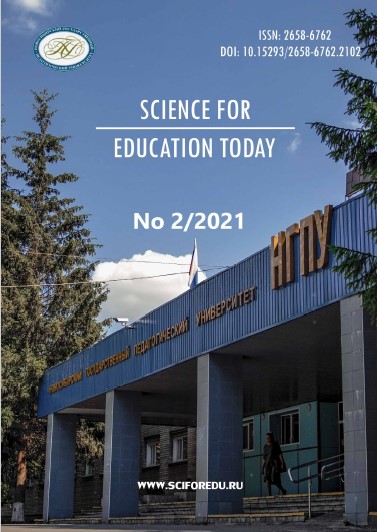Образование как деструктор социального порядка
Education as a destructor of social order
Author(s): Sergei Ivanovich CHERNYKH, Yaser Seifiddin Allaham, Vladimir Ivanovich ParshikovSubject(s): Education, Phenomenology, Social Norms / Social Control, Sociology of Education
Published by: Новосибирский государственный педагогический университет
Keywords: Education; Social order; Stability; Subjectivity of the educational space; Fictivization of education; Educational inequality; Turbulence;
Summary/Abstract: Introduction. The article examines the problem of the interdependence of the state and processes of changing the social order from the state and processes of changing social institutions designed to guarantee its stability. As one of such institutions, the educational system is considered, which in its traditional state actively performed a protective function, acting as a guarantor of the stability of the social order. In the context of the fourth industrial Revolution, the content and form of educational practices and the entire educational space have changed so much that education as a social institution loses the prerogative of protecting and guaranteeing the stability of the social order. The purpose of the article is to determine the main substrates underlying the social order on the basis of the historical and philosophical classification of the social order concepts, to show which turbulent phenomena in education most deform these substrates and thereby disqualify education in its function as a guarantor of the stability of both the social order and society as a whole. Materials and Methods. The historical and philosophical approach made it possible to form and classify the main concepts in the understanding of the social order and to differentiate its substrate bases using the tabular method. The activity-based and structural-functional approaches allowed us to identify the deforming phenomena that occur today in Russian education and have the greatest impact on the destabilization of the social order. To substantiate the conceptual and methodological basis of the study, the method of critical analysis of current research literature and the interpretation of the results obtained in it is used. Results. Historical and philosophical analysis has shown that the underlying foundations of the stability of the social order are (both in historical and modern explication) coercion, interests, values and norms, as well as cultural inertia. Social institutions (education, science, religion, law, etc.) ensure the functioning of the substrate bases, their correction in the direction of compliance with state needs, and thereby stabilize the existing social order as a system of governance and power mechanisms. However, the fourth technological revolution, which began in the second half of the XX – beginning of the XXI century, radically changed the functionality of social institutions. This historical period, due to the significance of the changes, was called the “era of turbulence” (A. Greenspan's term). This could not but affect the stability and foundations of the social order. The most pronounced deformations in the era of turbulence are those of education and science, that is, precisely those social institutions that, along with law and culture, in traditional societies served as a guarantor of the stability of the state. The greatest destabilizing effect of education on the social order is: the ongoing change in organizational paradigms of interaction between education and other spheres of public life (from “education-science-production” to “university – government – business”); the change in the status of subjects of educational interactions: the main object of educational interactions is the individual, business systems and the family, and not the state; fictivization of education (especially higher education) in its classical form, which manifests itself in the growing importance of virtual learning, narrow specialization and massization; the growth of educational inequality with its development into a social one. These phenomena really destabilize the social order both as values/norms, as cultural traditions, and as dialectically combined interests of the authorities and individuals. Conclusions. The study of the interactions of the social order has shown that the turbulent phenomena occurring in the social institutions of society can radically affect the stability of the social order. This, in turn, increases the turbulence in society as a whole
Journal: Science for Education Today
- Issue Year: 11/2021
- Issue No: 2
- Page Range: 81-101
- Page Count: 21
- Language: Russian

